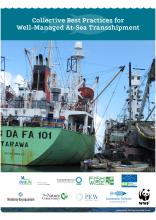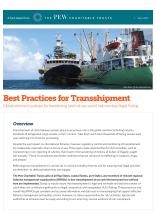Collective Best Practices for Well-Managed at Sea Transshipment
Agreed on by leading NGOs engaged in global tuna sustainability, the best practices outlined ensure that at-sea transshipment is well-managed and transparent. The best practices come in three facets: management best practices, data reporting best practices, and monitoring best practices. The policies include 100 percent observer coverage either human or electronic for all at-sea transshipment events, require information on all at-sea transshipment events to be shared with the relevant RFMO, prohibit vessels from acting as both a fishing vessel and carrier vessel on the same trip and a multitude of other policies that fisheries can work towards implementing.
Language

